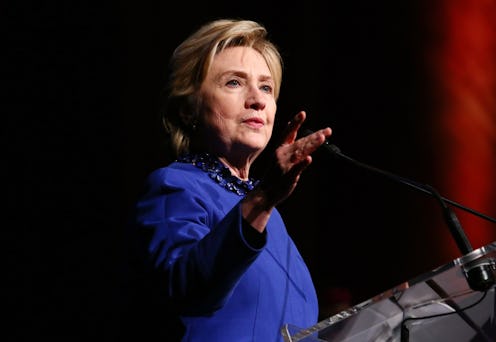News
The One Thing You Need To Be Asking About Verrit

Hillary Clinton took to Twitter on Sunday to endorse a new media platform created "for the 65.8 million" who voted for her last November, immediately igniting debate about the website's intentions and usefulness. The site describes itself as a "sanctuary in a chaotic media environment" that collects facts and quotes and verifies them for their truthfulness. Needless to say, it's not your average news website, so you might be wondering if Verrit is legit. Its fact-checking process, among other things, remains unclear.
Since its existence has come to most people's attention in the last 24 hours, not much is known about the site other than the fact that it was co-founded by Peter Daou, Clinton's former digital adviser, and his wife Leela Daou, a writer who's been vocal about her support for the former secretary of state.
Speaking to Business Insider, Peter Daou emphasized that Verrit's mission is to provide factual information in a media landscape filled with "fake news" and distrust of legitimate stories. Daou also insisted that the site was not a platform meant to aid Clinton's possible return to politics.
"When you lose a shared reality, where the definition of a fact is in question there’s no longer the possibility of civil dialogue anymore," Daou said. "If the person you're arguing with says, 'I’m not going to concede that a fact is even a fact,' you’ve got nothing left."
Daou also argued that the site's tagline — "Media for the 65.8 million," referring to the number of people who voted for the Democratic nominee — is not meant to suggest that the website is only for avid Clinton admirers. "Those voters are not a monolith," he said. "Those include Republicans, independents, Greens, Bernie Sanders supporters, Obama supporters. It’s a very diverse group of people. Of course, they all voted for the same person, but for different reasons."
Verrit's method of tackling false information will be providing visitors with the ability to create easily shareable e-cards — similar to those made by Someecards — displaying facts and quotes. Every approved card will have a numerical verification code which users can then type into the website to check its legitimacy.
However, who exactly will be in charge of verifying the information and how they'll do it has yet to be revealed. Considering the Daous' public admiration for Clinton, it's not surprising that many suspect the site is biased. Ultimately, only time will tell if the site is as useful of a fact-checker as it claims to be.